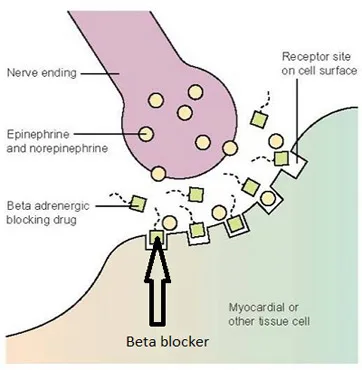What Are Beta Blockers?
Beta blockers are a class of medications that work by preventing the stimulation of beta-adrenergic receptors in the body. These receptors are responsible for mediating the effects of adrenaline (epinephrine) and noradrenaline (norepinephrine), which are hormones involved in the "fight or flight" response.
When beta receptors are blocked, the typical effects of these hormones—such as increased heart rate, heightened blood pressure, and stronger heart contractions—are reduced. As a result, beta blockers are commonly used to manage a variety of cardiovascular conditions.
Mechanism of Action
There are three main types of beta receptors:
- Beta-1 (B1): Present in the heart and kidneys, these receptors affect heart rate, contractility, and renin release. Blocking beta-1 receptors slows the heart rate, decreases the force of contraction, and reduces blood pressure by decreasing renin release.
- Beta-2 (B2): Found in the lungs, liver, and skeletal muscles, these receptors cause smooth muscle relaxation and glycogenolysis when activated. Blocking beta-2 receptors can lead to bronchoconstriction and decreased glycogenolysis, which is why non-selective beta blockers can be problematic for individuals with asthma or diabetes.
- Beta-3 (B3): Involved in the regulation of fat breakdown, these receptors are less clinically significant, and their blockade is not the primary focus of current clinical applications.

Types of Beta Blockers
Beta blockers can be classified based on their selectivity and generation:
- Selective Beta Blockers: These target beta-1 receptors found primarily in the heart. Examples include:
- Atenolol
- Metoprolol
- Bisoprolol
- Non-selective Beta Blockers: These block both beta-1 and beta-2 receptors, affecting the heart, lungs, and other tissues. Examples include:
- Propranolol
- Nadolol
- Timolol
- Third-Generation Beta Blockers: These have additional vasodilatory properties due to alpha-blocking effects or the release of nitric oxide. Examples include:
- Carvedilol
- Nebivolol
Therapeutic Applications of Beta Blockers
Beta blockers are widely used in medical practice, particularly for managing cardiovascular conditions. Their applications include:
- Hypertension: Beta blockers reduce blood pressure by decreasing heart rate and the force of contraction, as well as inhibiting renin release from the kidneys. They are often used in combination with other antihypertensive agents.
- Tachycardia and Arrhythmias: By slowing the heart rate and stabilising electrical conduction, beta blockers manage conditions like atrial fibrillation and supraventricular tachycardia.
- Myocardial Infarction (Heart Attack): After a heart attack, beta blockers reduce the workload on the heart and decrease the risk of subsequent cardiac events, preventing heart failure and recurrent infarction.
- Congestive Heart Failure: Specific beta blockers, including bisoprolol, carvedilol, and metoprolol succinate, improve heart function and reduce symptoms in heart failure patients.
- Coronary Artery Disease (Angina): By lowering heart rate and contractility, beta blockers reduce the heart's oxygen demand, effectively preventing chest pain in patients with coronary artery disease.
- Migraine Prophylaxis: Beta blockers like propranolol prevent migraines by stabilising blood vessel function and reducing the frequency and severity of attacks.
- Hyperthyroidism: In hyperthyroid patients, beta blockers control symptoms like palpitations, tremors, and anxiety by blocking the effects of excess thyroid hormone on the heart.
Side Effects
While beta blockers are generally safe, they can cause a range of side effects due to their widespread action on beta receptors throughout the body. Common adverse effects include:
- Bradycardia (Slow Heart Rate): Beta blockers slow the heart rate, potentially leading to dizziness, fatigue, and fainting in some patients.
- Hypotension (Low Blood Pressure): Excessive lowering of blood pressure can cause lightheadedness and fatigue.
- Bronchoconstriction: Non-selective beta blockers can cause bronchoconstriction, particularly in patients with asthma or chronic obstructive pulmonary disease (COPD), leading to difficulty breathing.
- Fatigue and Dizziness: Due to their effects on the heart and circulation, beta blockers can cause general fatigue and dizziness, especially when starting the medication or adjusting the dose.
- Sexual Dysfunction: Beta blockers have been associated with sexual side effects, including erectile dysfunction in men and decreased libido in both men and women.
- Sleep Disturbances: Some beta blockers, particularly those that cross the blood-brain barrier, can cause insomnia, vivid dreams, or nightmares.
Contraindications & Precautions
Beta blockers are not recommended for certain patients because they can potentially worsen existing health conditions. For instance:
- Asthma and COPD: Non-selective beta blockers should be avoided in patients with asthma or COPD due to the risk of bronchoconstriction. Cardio-selective beta blockers may be used with caution in these patients.
- Bradycardia and Heart Block: Patients with pre-existing bradycardia or heart block should not use beta blockers, as they can further slow the heart rate and worsen these conditions.
- Raynaud's Phenomenon: Beta blockers can worsen symptoms of Raynaud's phenomenon, a condition characterised by reduced blood flow to the extremities, leading to cold hands and feet.
Conclusion
Beta blockers are useful in the management of various cardiovascular conditions, and their importance is reflected in the OPRA exam. Make sure to thoroughly review the pharmacology, therapeutic uses, and potential side effects of beta blockers as part of your exam preparation. To ensure you're thoroughly prepared, enrol in Academically’s specialised OPRA preparation course. Our expert-led courses are designed to help you understand complex topics like beta blockers and pass the OPRA exam, paving the way for your successful pharmacy career in Australia.





